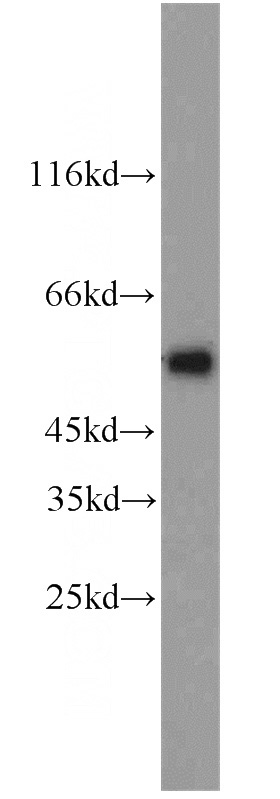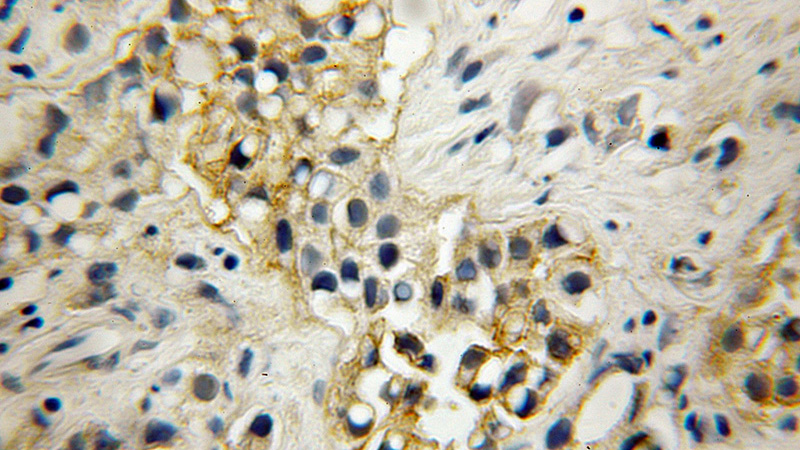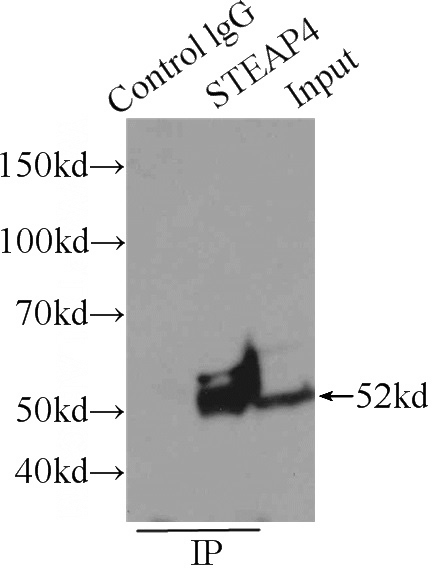-
Product Name
STEAP4 antibody
- Documents
-
Description
STEAP4 Rabbit Polyclonal antibody. Positive IHC detected in human prostate cancer tissue. Positive IP detected in A549 cells. Positive WB detected in 3T3-L1 cells, human brain tissue, human liver tissue, rat liver tissue. Observed molecular weight by Western-blot: 52-55 kDa
-
Tested applications
ELISA, WB, IHC, IP
-
Species reactivity
Human, Mouse, Rat; other species not tested.
-
Alternative names
DKFZp666D049 antibody; FLJ23153 antibody; Metalloreductase STEAP4 antibody; STAMP2 antibody; STEAP family member 4 antibody; STEAP4 antibody; TIARP antibody; TNFAIP9 antibody
-
Isotype
Rabbit IgG
-
Preparation
This antibody was obtained by immunization of STEAP4 recombinant protein (Accession Number: NM_001205316). Purification method: Antigen affinity purified.
-
Clonality
Polyclonal
-
Formulation
PBS with 0.1% sodium azide and 50% glycerol pH 7.3.
-
Storage instructions
Store at -20℃. DO NOT ALIQUOT
-
Applications
Recommended Dilution:
WB: 1:500-1:5000
IP: 1:500-1:5000
IHC: 1:20-1:200
-
Validations

3T3-L1 cells were subjected to SDS PAGE followed by western blot with Catalog No:115706(STEAP4 antibody) at dilution of 1:1000

Immunohistochemical of paraffin-embedded human prostate cancer using Catalog No:115706(STEAP4 antibody) at dilution of 1:50 (under 10x lens)

IP Result of anti-STEAP4 (IP:Catalog No:115706, 4ug; Detection:Catalog No:115706 1:1000) with A549 cells lysate 1600ug.
-
Background
STEAP4 (also called STAMP2), is a member of the STEAP family. Structurally, It is a 459 amino acid protein characterized by a molecular topology of six transmembrane domains. The cytoplasmic N-terminal domain of STEAP4 shows structural similarity with bacterial and archaeal FNO oxidoreductase and STEAP4 exhibits a strong iron reductase activity. Studies in mice and human suggest that STEAP4 maybe involved in adipocyte development and metabolism, and may contribute to the normal biology of the prostate cell, as well as prostate cancer progression.
-
References
- Kim HY, Park SY, Lee MH. Hepatic STAMP2 alleviates high fat diet-induced hepatic steatosis and insulin resistance. Journal of hepatology. 63(2):477-85. 2015.
- Arner P, Stenson BM, Dungner E. Expression of six transmembrane protein of prostate 2 in human adipose tissue associates with adiposity and insulin resistance. The Journal of clinical endocrinology and metabolism. 93(6):2249-54. 2008.
- Kralisch S, Sommer G, Weise S. Interleukin-1beta is a positive regulator of TIARP/STAMP2 gene and protein expression in adipocytes in vitro. FEBS letters. 583(7):1196-200. 2009.
- Catalán V, Gómez-Ambrosi J, Rodríguez A. Six-transmembrane epithelial antigen of prostate 4 and neutrophil gelatinase-associated lipocalin expression in visceral adipose tissue is related to iron status and inflammation in human obesity. European journal of nutrition. 52(6):1587-95. 2013.
- Narvaez CJ, Simmons KM, Brunton J, Salinero A, Chittur SV, Welsh JE. Induction of STEAP4 correlates with 1,25-dihydroxyvitamin D3 stimulation of adipogenesis in mesenchymal progenitor cells derived from human adipose tissue. Journal of cellular physiology. 228(10):2024-36. 2013.
- Sikkeland J, Saatcioglu F. Differential expression and function of stamp family proteins in adipocyte differentiation. PloS one. 8(7):e68249. 2013.
- Han L, Tang MX, Ti Y. Overexpressing STAMP2 improves insulin resistance in diabetic ApoE⁻/⁻/LDLR⁻/⁻ mice via macrophage polarization shift in adipose tissues. PloS one. 8(11):e78903. 2013.
- Jin Y, Wang L, Qu S. STAMP2 increases oxidative stress and is critical for prostate cancer. EMBO molecular medicine. 7(3):315-31. 2015.
Related Products / Services
Please note: All products are "FOR RESEARCH USE ONLY AND ARE NOT INTENDED FOR DIAGNOSTIC OR THERAPEUTIC USE"
